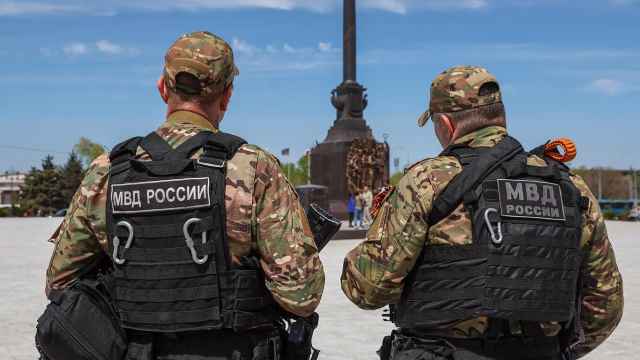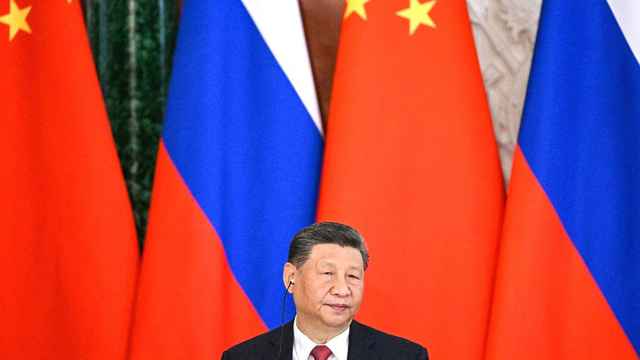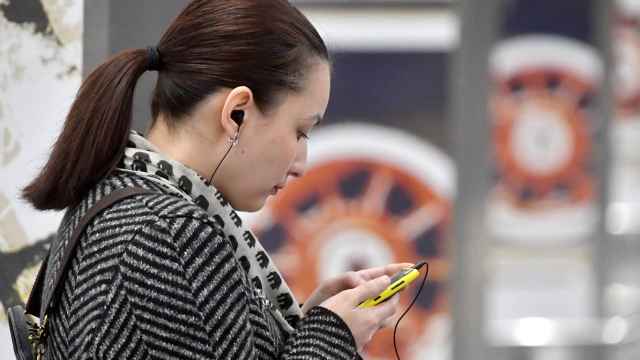KIEV — President Viktor Yanukovych pressed the European Union on Thursday to conclude a milestone political and trade deal with Ukraine this year, but he gave no ground on a key EU demand that he free jailed opponent Yulia Tymoshenko.
Yanukovych made his call in a state-of-the-nation address issued in text form only, stirring the anger of pro-Tymoshenko lawmakers who demanded he appear in person to deliver it.
Kiev would like to sign agreements with the EU on political association and free trade at a summit with other east European states in November in the Lithuanian capital Vilnius.
But the 27-member bloc first wants more tangible proof of Ukraine's commitment to democratic reforms, including the release of Tymoshenko, a former prime minister and Yanukovych's fiercest opponent, from a seven-year jail sentence.
The free-trade agreement potentially on offer from the EU would open up a huge market for Ukrainian exports — steel, grain, chemicals and food products — and provide a powerful spur for much-needed foreign investment.
"Concluding the agreement on association for Ukraine … will shift our state's cooperation with the EU onto a qualitatively new level of political association and economic integration," Yanukovych said in his address.
"We hope that it will be signed at the Vilnius 'Eastern Partnership' summit at the end of 2013," he said.
He made no mention of Tymoshenko or of the EU conditions for signing the association agreement.
Tymoshenko, the 52-year-old heroine of the 2004 "Orange Revolution" street protests that overturned an election rigged in Yanukovych's favor, was sentenced in October 2011 for abuse of office linked to a 2009 gas deal she brokered with Russia.
The EU says her sentence smacks of political vengeance by Yanukovych and use of "selective justice."
Yanukovych's comments followed Ukraine's signing of a deal to secure observer status in a Russia-led Customs Union trade bloc that also includes two other former Soviet republics, Belarus and Kazakhstan.
Ukraine has come under pressure from Russia to join the Customs Union, a move that would bring it much-needed cheaper gas from its main energy provider, but has resisted because it would not be compatible with an EU free trade agreement.
As the clock ticks down towards the Vilnius summit, EU diplomats say pressure is growing on Yanukovych to review his hardline stance on Tymoshenko and bring about her release.
In April, Yanukovych won rare praise from the West for freeing former interior minister Yuri Lutsenko — a Tymoshenko ally — from a four-year sentence for abuse of office.
But Tymoshenko is a much tougher case. If she were freed and politically rehabilitated she could mount a formidable challenge for the presidency when Yanukovych seeks re-election in 2015.
EU heavyweight Germany has offered to provide Tymoshenko with medical treatment in Berlin for chronic back problems she has suffered for most of her time in detention.
Some analysts see this as a possible solution that would allow Yanukovych to clinch a deal with the EU while also ensuring that Tymoshenko, who ran him close for the presidency in February 2010, remains out of the political running in 2015.
"The only and most likely option is for Tymoshenko to go abroad for medical treatment. Negotiations are going on about this including with Tymoshenko herself," said Volodymyr Fesenko, analyst of the Penta political think tank.
"It is the only variant which can be acceptable to Europe and the Ukrainian leadership. Other possibilities, for example freeing Tymoshenko and dropping criminal charges against her, are extremely unlikely," he said.
A Message from The Moscow Times:
Dear readers,
We are facing unprecedented challenges. Russia's Prosecutor General's Office has designated The Moscow Times as an "undesirable" organization, criminalizing our work and putting our staff at risk of prosecution. This follows our earlier unjust labeling as a "foreign agent."
These actions are direct attempts to silence independent journalism in Russia. The authorities claim our work "discredits the decisions of the Russian leadership." We see things differently: we strive to provide accurate, unbiased reporting on Russia.
We, the journalists of The Moscow Times, refuse to be silenced. But to continue our work, we need your help.
Your support, no matter how small, makes a world of difference. If you can, please support us monthly starting from just $2. It's quick to set up, and every contribution makes a significant impact.
By supporting The Moscow Times, you're defending open, independent journalism in the face of repression. Thank you for standing with us.
Remind me later.





